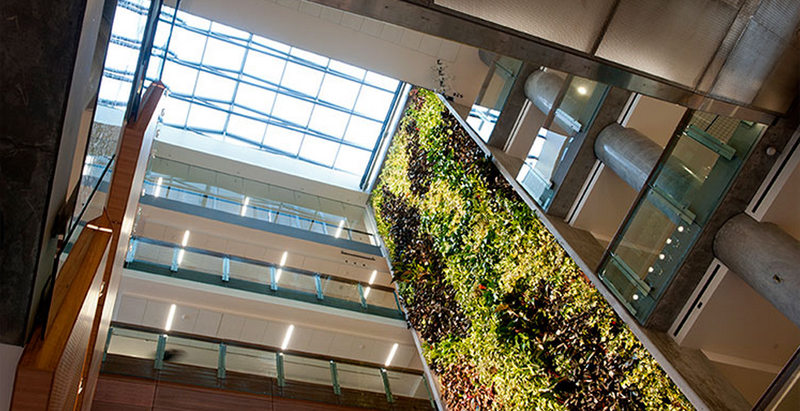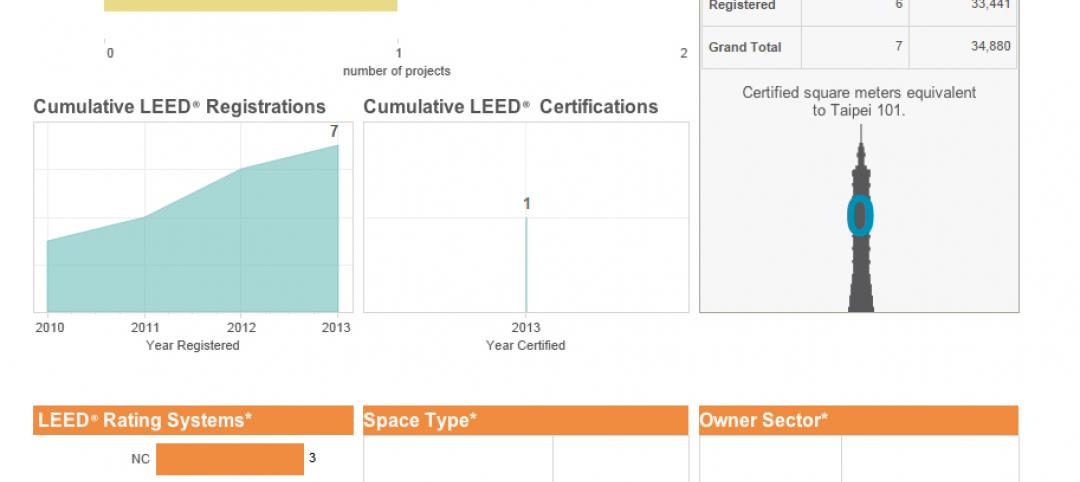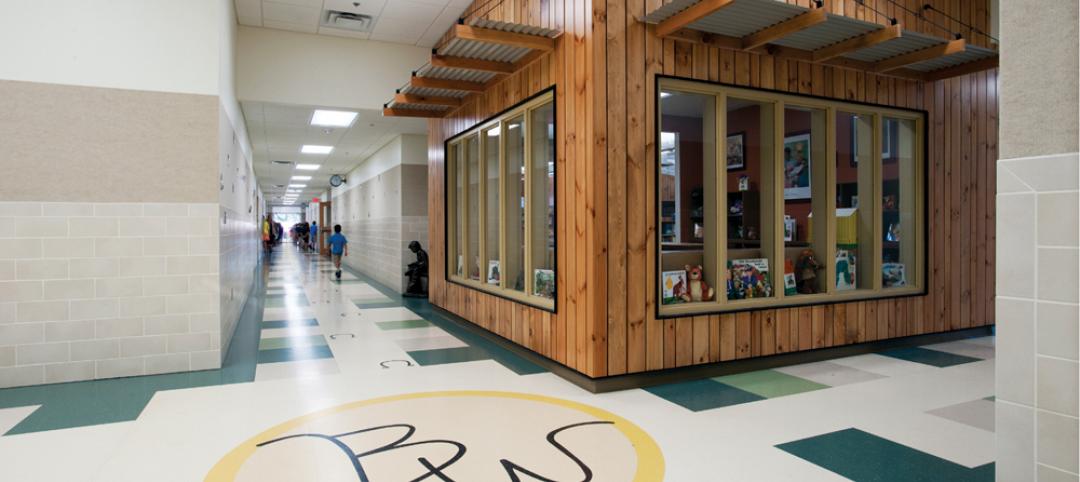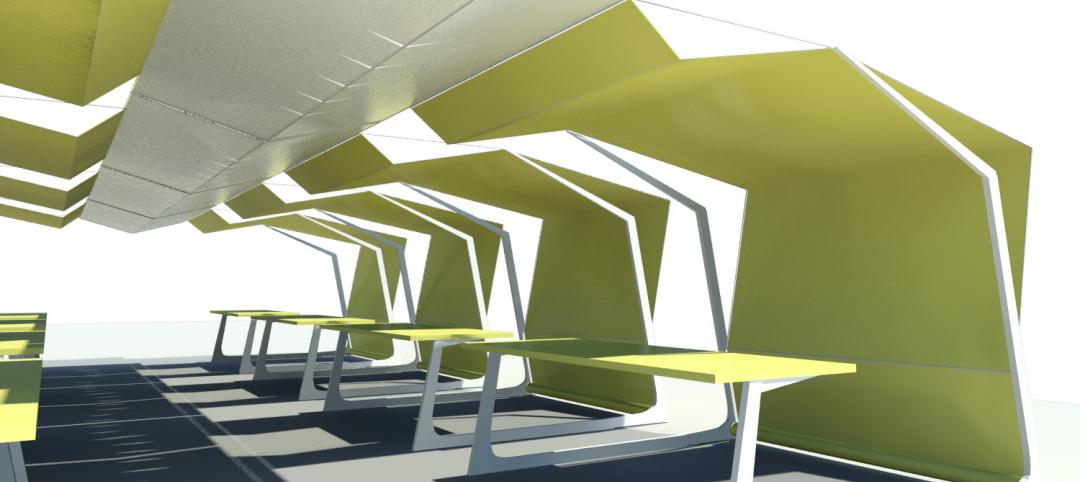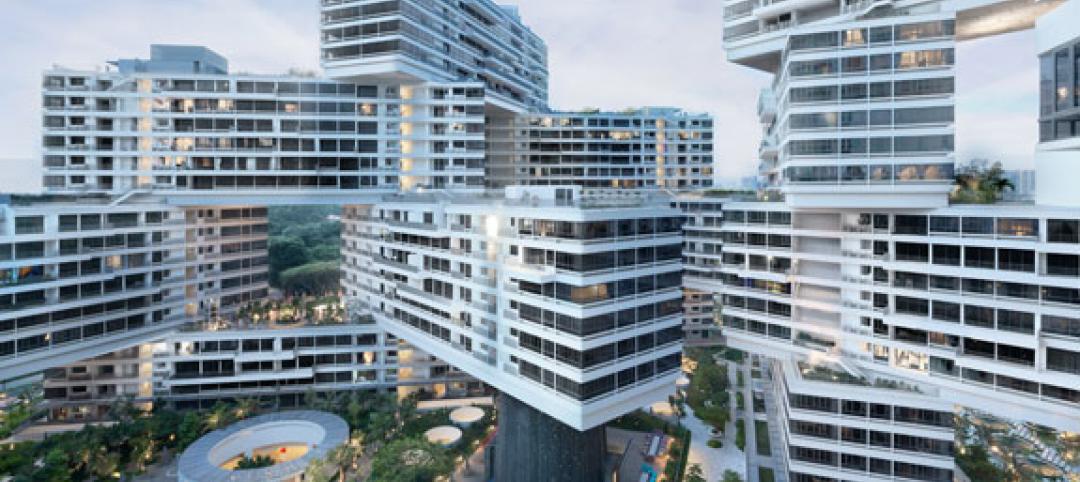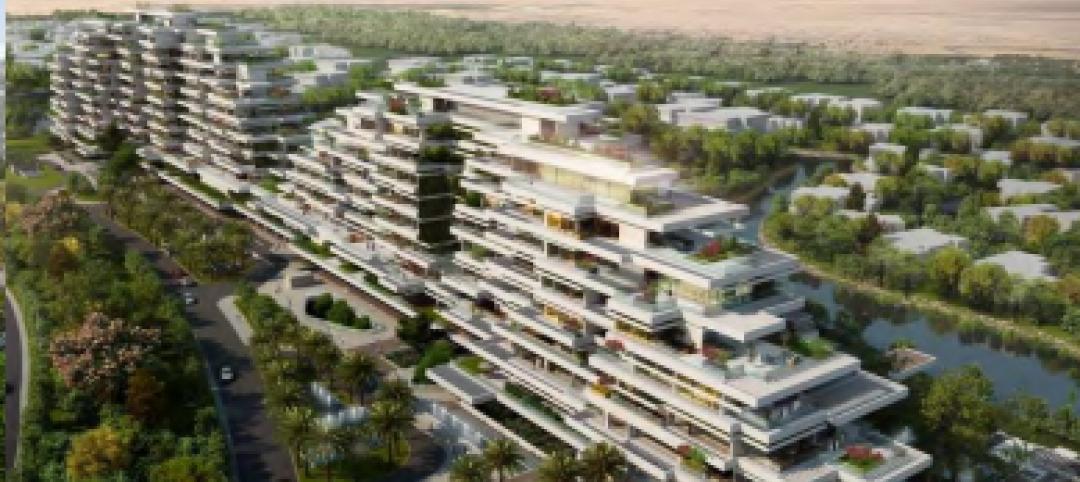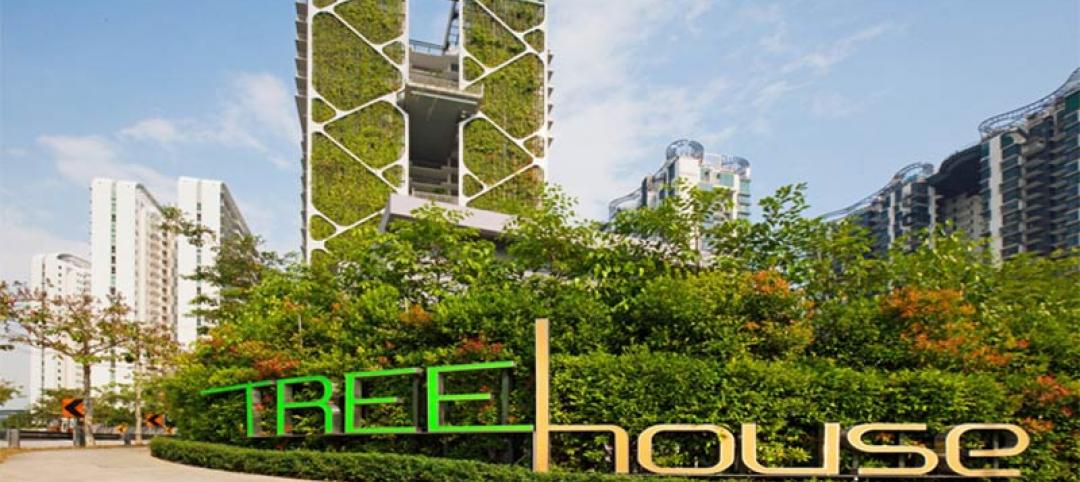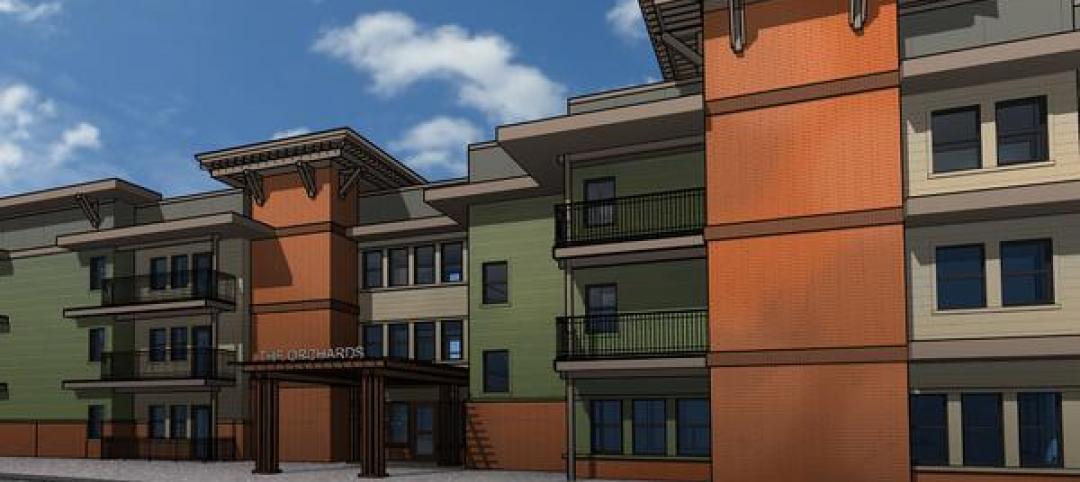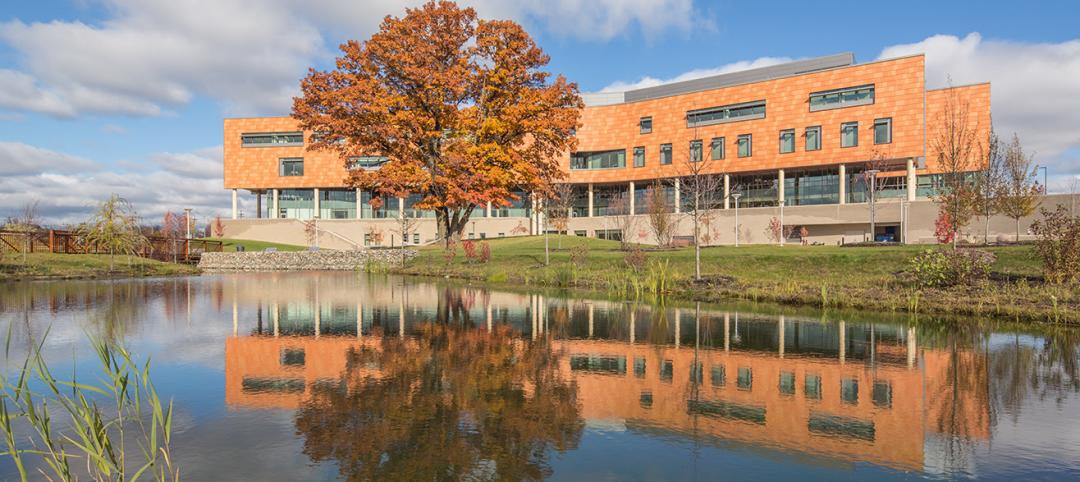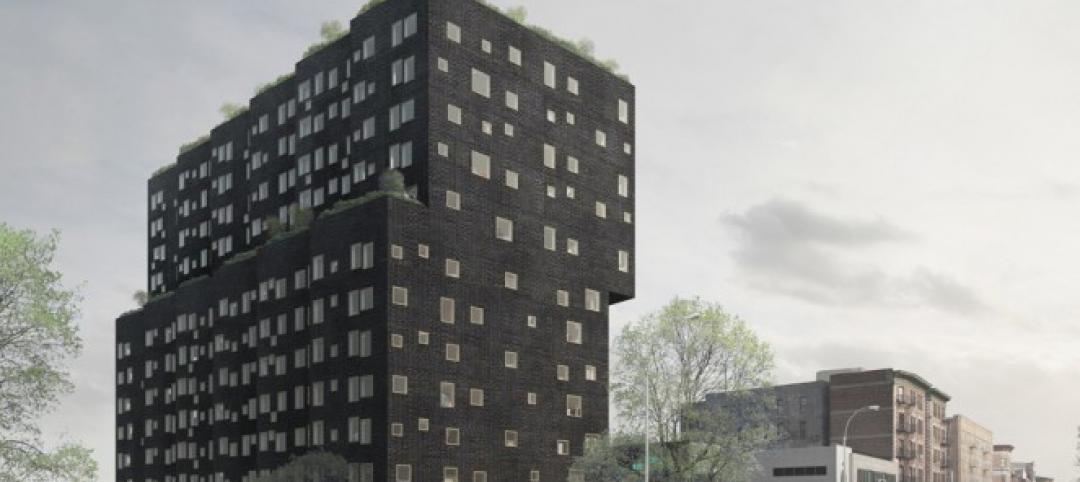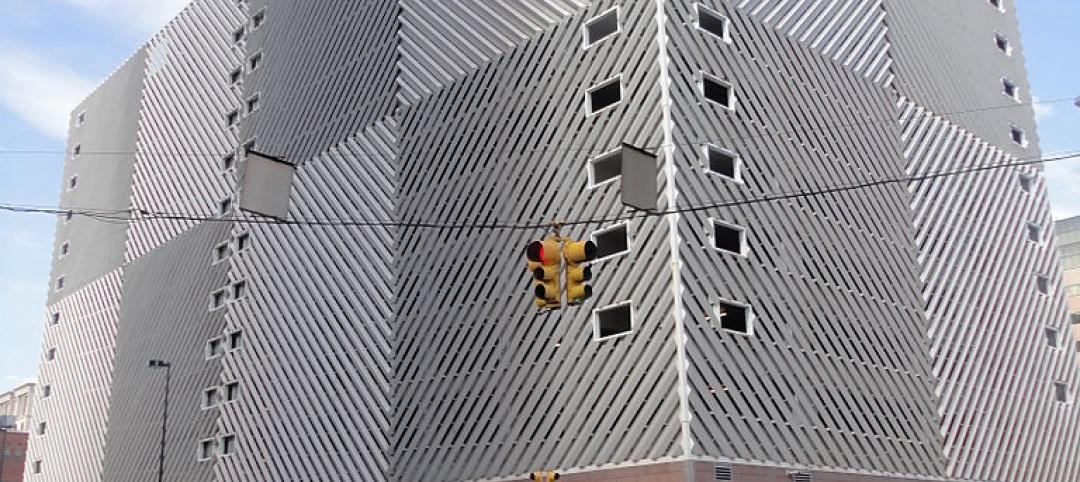Located in the heart of University of Ottawa, the 15-story Vanier Hall functions as the new home of the large Faculty of Social Science and ‘stands tall’ as a living example of sustainable design boasting the intangibles of a rich and inspiring learning atmosphere, plus the measurable returns of energy saving technology.
From an exterior view, the green plant wall provides a striking contrast to the glass and steel structure. Once inside, visitors can fully appreciate a spectacular six-story-high feature – the largest living wall biofilter in North America at 1,370 square feet. In addition to the aesthetic impact, the biofilter is also part of the building’s sustainable design efforts.
Improves Air Quality and Building Performance
In simple terms, a Nedlaw Living Wall Biofilter is a working machine that harnesses nature’s remarkable ability to ‘eat’ pollutants. Contaminated indoor air is drawn through the biofilter where microorganisms on the root media consume airborne pollutants as food. This removal process cleans 80 – 85% of volatile organic compounds (VOCs) from the air, creating virtual outside air. The cleansed air is then re-circulated through the buidling’s HVAC system.
The ‘soft’ benefits of the living wall include dust control, sound abatement, white noise in the form of running water, and a noticeable ‘smell’ of fresh air.
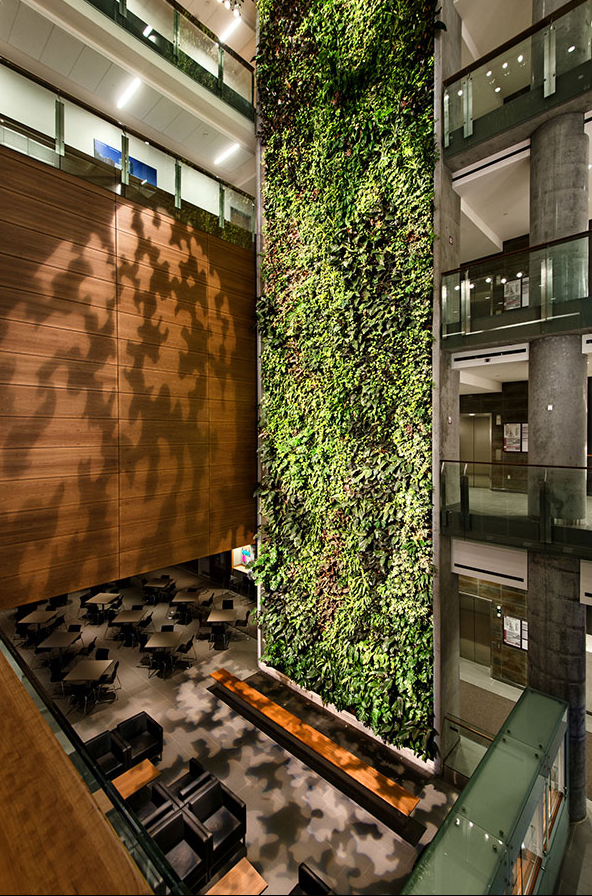
In terms of improving building performance, the biofilter at Vanier Hall can provide 75 – 80% of the building’s fresh air intake requirement, which not only enhances air quality but also significantly improves energy performance by reducing the amount of air intake and, consequently, heating and cooling costs. Additionally, the wall provides all of the building’s humidity and no mechanical humidification is needed.
The living wall biofilter at Vanier Hall includes energy smart features designed to address certain energy lapses in traditional building systems. For example, water recycled from storm water runoff and HVAC condensation is used for the hydroponic plant wall. According to Dr. Alan Darlington (founder of Nedlaw Living Walls), “We’ve done a lot of work to streamline and make this as efficient as possible without losing the aesthetics of this system.”
Calculating the ROI of Living Wall Biofilters
In recent years, Nedlaw has completed numerous studies to show the effectiveness of contaminant removal from indoor air and has now quantified the return on investment based on energy savings. By replacing outdoor air that needs to be conditioned, a Nedlaw Living Wall Biofilter reduces a building’s energy needs. In general terms, a fully-integrated biofilter can reduce energy costs by up to 30%, because the biofilters provide clean air at a fraction of the cost of traditional systems.
In a recent study completed for a major international retail chain, it was determined that the proposed living wall biofilter could provide 100 litres per second of outside air – meaning the building needed to take in that much less outside air.
Using the biofilter as a source of clean air would reduce the energy consumption of the HVAC system by 32.5 GJ of energy for square metre of biofilter used. If properly integrated into the building (for example, naturally lit and connected directly to the HVAC), the biofilter would require as little as 0.4 GJ of energy per square metre per year. This gives a total annual energy savings of the system of 32.1 GJ. This is equivalent to roughly 5 barrels of oil or 1.6 tonnes of CO2 saved per square metre of biofilter.
For this study, it was determined that approximately 400 m2 of biofilter would be used. Assuming a combined energy cost for electricity and natural gas of $10 USD per GJ and if the biofilter is used to its maximum potential then the payback period for the capital cost associated with the biofilter could be less than 3 - 5 years.
PROJECT DETAILS
Location: University of Ottawa, Vanier Hall
Architect: Diamond Schmitt Architects, KWC Architects
Award of Excellence / Interior Green Wall - Green Roofs for Healthy Cities
LEED Gold Certified
MEDIA COVERAGE
University of Ottawa Tower Wins 3 Awards
ABOUT NEDLAW LIVING WALL BIOFILTERS
Related Stories
| Jul 10, 2014
New tool aggregates LEED project info for over 150 countries
The U.S. Green Building Council announced the launch of an expanded online data visualization resource that will allow any user to access aggregated LEED green building project information in the more than 150 countries with LEED projects.
| Jul 2, 2014
Emerging trends in commercial flooring
Rectangular tiles, digital graphic applications, the resurgence of terrazzo, and product transparency headline today’s commercial flooring trends.
| Jun 30, 2014
4 design concepts that remake the urban farmer's market
The American Institute of Architects held a competition to solve the farmer's markets' biggest design dilemma: lightweight, bland canopies that although convenient, does not protect much from the elements.
| Jun 30, 2014
OMA's The Interlace honored as one of the world's most 'community-friendly' high-rises
The 1,040-unit apartment complex in Singapore has won the inaugural Urban Habitat award from the Council on Tall Buildings and Urban Habitat, which highlights projects that demonstrate a positive contribution to the surrounding environment.
| Jun 19, 2014
First Look: 10 Design unveils new luxury apartments plan in Dubai
The Seventh Heaven complex features a stepped form that will offer stunning views of the Dubai skyline.
| Jun 19, 2014
Singapore's 'Tree House' vertical gardens break Guinness World Record
The high-rise development will have a 24,638-sf vertical garden, breaking a Guinness World Record.
| Jun 18, 2014
Largest Passive House structure in the U.S. to be built in Oregon
Orchards at Orenco, a 57-unit affordable housing complex in Hillsboro, Oregon, is the first of a three-phase, three-building complex.
| Jun 12, 2014
SmithGroup finishes 100th LEED-certified project
With the construction of the LEED-NC Platinum Oakland University Human Health Building, constructed in Rochester, Michigan, SmithGroupJJR recently achieved its 100th LEED certified project.
| Jun 11, 2014
David Adjaye’s housing project in Sugar Hill nears completion
A new development in New York's historic Sugar Hill district nears completion, designed to be an icon for the neighborhood's rich history.
| Jun 2, 2014
Parking structures group launches LEED-type program for parking garages
The Green Parking Council, an affiliate of the International Parking Institute, has launched the Green Garage Certification program, the parking industry equivalent of LEED certification.


